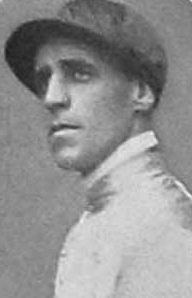Joe Childs
| Joe Childs | |
|---|---|

Joe Childs on the cover of Baily's Magazine, 1921
|
|
| Occupation | Jockey |
| Born | 1884 Chantilly, France |
| Died | 1958 Portsmouth, England |
| Major racing wins | |
|
British Classic Race wins as jockey: 1,000 Guineas (1928, 1933) 2,000 Guineas (1918, 1931) Epsom Oaks (1912, 1916, 1919, 1921) Epsom Derby (1916, 1918, 1926) St. Leger (1918, 1921, 1925, 1926) |
|
| Honours | |
| British Triple Crown (1918) | |
| Significant horses | |
| Coronach, Fifinella, Gainsborough, Solario | |
Joseph "Joe" Childs (1884–1958) was a French-born, British-based flat racing jockey. He won fifteen British Classics in a 35-year career, the last ten years of which were spent as jockey to King George V. He was known for riding a slow, waiting race, and also for having a short temper which regularly saw him at odds with his trainers and owners.
Childs was born in Chantilly into a racing family. His father had ridden successfully in France, and his grandfather had worked at the stables of Peter Price in Newmarket. There were also four brothers – Albert, Arthur, Charles and Henry – who all became jockeys. Joe would go on to be the foremost of these, but Charles would win the 1916 St. Leger on Hurry On, two years before Joe himself won it. Albert became a trainer in Marseilles, France.
Childs was married to Emily Lavis (1887–1914) like Childs she was from a racing family, born in Chantilly and the daughter of racing trainer Alfred James Lavis, they had one child Joey who died in 1916.
Childs spent his apprenticeship at Phantom House, Newmarket, the stables of trainer, Tom Jennings Jr. His first winner came for Jennings in 1900 at the now defunct Lincoln Racecourse on a horse called Lady Alicia. He was aged just 16. The following year he took a step up, winning the Royal Hunt Cup at Royal Ascot on Stealaway and the final November Handicap to be run at the New Barns course in Manchester before it was relocated. In 1902, he won the valuable Great Metropolitan Handicap at Epsom and the Goodwood Cup. Yet, despite these wins, he was beginning to struggle to get rides. He no longer qualified for the apprentice weight allowance, which made him a less attractive proposition as a jockey. In response to this problem, Jennings arranged for him to spend some time in Europe.
...
Wikipedia
